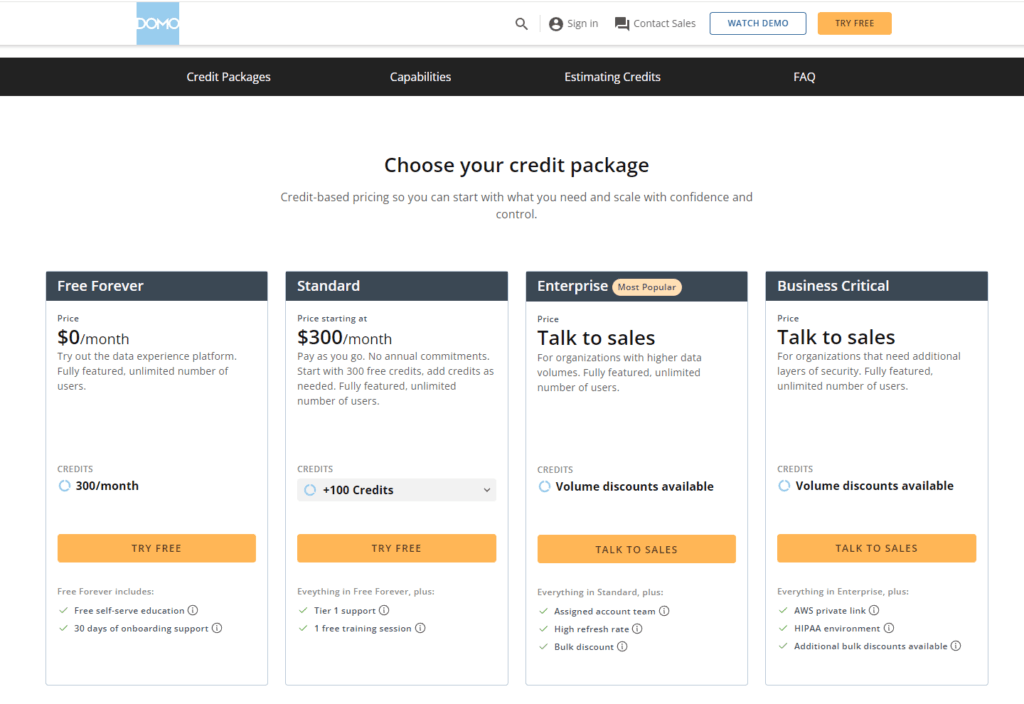In today’s digital landscape, the abundance of data can be both a blessing and a curse. With the right analytics tool, this data transforms into actionable insights, guiding your business to new heights. However, the quest to find that perfect companion in a sea of analytics platforms can be daunting. Enter Crazy Egg and Domo—two giants with distinct approaches to data analytics, each promising to illuminate the path to informed decision-making. As we navigate through the capabilities of Crazy Egg and Domo, let’s delve into their user interface and experience, a crucial battlefield where many tools vie for supremacy, yet few truly excel.
Crazy Egg | Domo |
|---|---|
| G2 Score – 4.2 out of 5 stars | G2 Score – 4.4 out of 5 stars |
| TrustRadius Score – 7.6/10 | TrustRadius Score – 8.5/10 |
User Interface and Experience
Crazy Egg: Visual Analytics Simplified
Crazy Egg shines in its simplicity and focus on visual analytics. Designed with the user in mind, its interface is intuitive, making it accessible for beginners and seasoned marketers alike. Crazy Egg’s strength lies in its heatmap tools, scroll maps, and confetti reports, which provide a visual representation of user behavior on your site. This visualization makes it easy to understand complex data at a glance, allowing you to quickly identify areas of your website that engage users and those that may need improvement.
The platform’s straightforward dashboard enables users to set up and analyze A/B tests without the need for in-depth statistical knowledge, further emphasizing its commitment to an accessible user experience. For businesses and individuals looking to dive into user behavior analytics without getting overwhelmed by complexity, Crazy Egg offers a compelling solution.
Domo: Comprehensive Data at Your Fingertips
Domo, on the other hand, caters to a different audience, offering a robust, feature-rich platform designed to handle not just website analytics but an entire business’s data ecosystem. Its interface is sophisticated, reflecting the comprehensive nature of the insights Domo provides. Users can connect, transform, and visualize data from hundreds of sources, making it a powerhouse for those who need to integrate and analyze information across various aspects of their business.
Domo’s dashboard and reporting tools are highly customizable, offering a wealth of visualization options, from standard graphs and charts to more advanced, interactive data visualizations. This level of customization and depth makes Domo an attractive option for larger organizations or businesses with complex data analysis needs. However, the platform’s extensive capabilities can present a steeper learning curve, requiring more time and effort to fully leverage its potential.
Data Visualization and Reporting
Crazy Egg:
Crazy Egg shines in the realm of user interaction data, providing insights that are as actionable as they are visual. Known for its heatmap technology, Crazy Egg allows you to see exactly where users are clicking, scrolling, and spending time on your pages. This visual representation is intuitive, turning abstract data into clear, actionable insights. Beyond heatmaps, Crazy Egg offers scroll maps, confetti maps, and overlay tools, each designed to give you a different perspective on how users interact with your site.
Crazy Egg’s reports are straightforward, focusing on visual data that’s easy to understand at a glance. This simplicity is key for teams that need to quickly identify usability issues or opportunities for optimization without diving into complex data analysis. However, while Crazy Egg excels in visualizing user behavior data, businesses needing in-depth reporting across a wider range of metrics may find its capabilities limiting.
Domo:
Domo, in contrast, is a powerhouse when it comes to data visualization and reporting, offering a broad spectrum of capabilities designed to cater to complex, multi-source data environments. Domo’s platform excels in aggregating data from various sources, providing a unified view of business performance across multiple domains. Its visualization tools are highly customizable, allowing users to create dashboards and reports that not only present data but tell a story.
With Domo, you can drill down into specifics with granular precision or zoom out for a high-level overview, making it suitable for users across the organizational spectrum, from data analysts to C-level executives. The platform’s strength lies in its flexibility and the depth of insights it can provide, making it an ideal choice for businesses that rely on comprehensive data analysis to inform strategic decisions.

Related: Check out our free SEO suite

Integration Capabilities
In today’s digital landscape, where businesses use a multitude of software and platforms, the ability of an analytics tool to integrate with these existing systems can significantly enhance its utility. Let’s examine how Crazy Egg and Domo stack up in this regard. This dimension is crucial for businesses looking to create a seamless flow of data across various platforms and tools they already use.
Crazy Egg:
Crazy Egg is primarily focused on website analytics, particularly visualizing user behavior through heatmaps, scroll maps, and other user interaction recordings. Its integration capabilities are designed to complement its core functionalities, offering straightforward plugins and embed codes for easy installation on most websites. Crazy Egg integrates smoothly with popular website platforms like WordPress, Shopify, and Squarespace, making it accessible to a wide range of users without requiring extensive technical knowledge. However, when it comes to integrating with broader business intelligence tools or CRM systems, Crazy Egg’s capabilities are more limited. The platform is best suited for users whose primary integration need revolves around enhancing their website’s user experience and conversion rate optimization.
Domo:
Domo, on the other hand, positions itself as a comprehensive business intelligence (BI) tool that excels in data integration and aggregation from a wide variety of sources. Domo’s strength lies in its ability to connect with hundreds of data sources, including sales and marketing platforms, social media, databases, and even custom data feeds. This extensive integration ecosystem allows businesses to consolidate all their data in one place, providing a unified view of operations, performance, and customer interactions. Domo offers not just data visualization but also the capability to perform complex analyses, making it a powerful tool for organizations looking to derive actionable insights from across their entire digital footprint.
Scalability and Future-proofing
Expanding our comparison to encompass Scalability and Future-proofing, we address how Crazy Egg and Domo adapt to the evolving needs of growing businesses. In an era where digital landscapes shift rapidly, selecting an analytics tool that not only meets current needs but also anticipates future demands is essential for long-term success.
Crazy Egg:
Crazy Egg is renowned for its user-friendly interface and insightful visualization tools, making it an excellent choice for small to medium-sized businesses focusing on optimizing website user experience. Its scalability is primarily seen through its tiered pricing structure, which allows businesses to upgrade their plans as their site traffic and data analysis needs grow. However, Crazy Egg’s core focus remains on website interaction analytics, which means its scalability is somewhat confined to this realm. While perfectly suited for businesses whose primary growth strategy revolves around enhancing website performance, Crazy Egg may not fully meet the needs of rapidly scaling enterprises looking for broader data integration and analysis capabilities across multiple digital channels.
Domo:
Domo, with its robust data integration and business intelligence features, is designed to scale alongside businesses of all sizes. Domo stands out for its ability to handle vast amounts of data from various sources, offering powerful analytics capabilities that can support complex decision-making processes. Its platform is built to accommodate the needs of large enterprises, featuring extensive customization options, advanced data security measures, and the capacity to process and analyze data at scale. Domo’s commitment to staying at the forefront of business intelligence technology makes it a future-proof choice for organizations that anticipate significant growth or diversification of their data analytics needs.
Security and Compliance
In an era where data breaches are not just a nuisance but a significant threat to a company’s reputation and bottom line, understanding how your analytics tool handles data security and regulatory compliance is vital. The digital landscape is fraught with regulatory requirements like GDPR in Europe, CCPA in California, and various other data protection laws worldwide. Businesses must ensure their analytics tools not only offer insights to drive growth but also protect user data and comply with these regulations to avoid hefty fines and loss of consumer trust.
Crazy Egg:
Crazy Egg emphasizes user data protection as a core component of its service. It provides features that help website owners comply with GDPR and other privacy regulations, such as options for anonymizing visitor IP addresses and obtaining consent for tracking. Crazy Egg’s approach to security includes standard practices like secure data transmission and storage, aiming to protect both the website data it analyzes and the privacy of users visiting those sites. For small to medium-sized businesses primarily focused on enhancing their website’s user experience and conversion rates, Crazy Egg offers a balance between powerful analytics capabilities and the need for privacy and security compliance.
Domo:
Domo takes data security and compliance to another level, reflective of its role as a comprehensive business intelligence platform handling sensitive company data across various domains. Domo is designed with enterprise-level security features, including end-to-end data encryption, robust access controls, and compliance with a wide array of international data protection regulations. Its platform is built to cater to businesses with stringent security requirements, offering transparency and control over data handling processes. For organizations that need to aggregate large volumes of data from diverse sources, Domo provides the assurance that security and compliance are built into every layer of the analytics process.
Pricing
Crazy Egg:

Domo:

Conclusion
Concluding our exploration into the comparison between Crazy Egg and Domo, we’ve navigated through a variety of critical considerations that influence the selection of the right analytics tool for your needs. From the depth of analytics features and capabilities to the intricacies of integration, security, and compliance, each platform has its strengths and offerings tailored to different business requirements and goals.
Crazy Egg shines as a specialized tool focusing on enhancing website user experience through detailed visualization of user behavior, such as heatmaps and session recordings. Its straightforward approach to data collection and analysis, combined with user-friendly privacy features, makes it an excellent choice for small to medium businesses looking to optimize their websites without the need for deep, complex data analysis. Crazy Egg’s simplicity, ease of use, and focus on visual analytics help businesses quickly identify and act on opportunities to improve user engagement and conversion rates.
Domo, on the other hand, positions itself as a comprehensive business intelligence solution, offering robust data integration, visualization, and analysis capabilities across a wide spectrum of data sources. Its emphasis on security and compliance, coupled with powerful business analytics features, makes Domo well-suited for larger enterprises or organizations with complex analytics needs that span across multiple domains and require in-depth, actionable insights to drive strategic decisions. Domo’s scalability and extensive integration ecosystem provide a solid foundation for businesses aiming to leverage data analytics at an enterprise level.
Read Next:
- Mailchimp vs SendinBlue: The Best Email Marketing Tool for 2024
- ConvertKit vs Moosend: The Best Email Marketing Tool for 2024
- ActiveCampaign vs EmailOctopus: The Best Email Marketing Tool for 2024
- AWeber vs EmailOctopus: The Best Email Marketing Tool
- GetResponse vs eSputnik: The Best Email Marketing Tool for 2024






















Comments are closed.